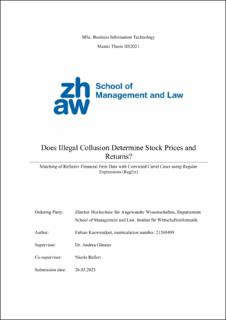Please use this identifier to cite or link to this item:
https://doi.org/10.21256/zhaw-29332| Publication type: | Master thesis |
| Title: | Does illegal collusion determine stock prices and returns? : matching of refinitive financial firm data with convicted cartel cases using Regular Expressions (RegEx) |
| Authors: | Kaewmulpet, Fabian |
| Advisors / Reviewers: | Günster, Andrea Maria Bellert, Nicole |
| DOI: | 10.21256/zhaw-29332 |
| Extent: | 69 |
| Issue Date: | 2023 |
| Publisher / Ed. Institution: | ZHAW Zürcher Hochschule für Angewandte Wissenschaften |
| Publisher / Ed. Institution: | Winterthur |
| Language: | English |
| Subject (DDC): | 332.6: Investment |
| Abstract: | In the dynamic landscape of business and economics, understanding the factors that influence stock prices and returns is crucial for effective decision-making and strategic planning. This study delves into the intricate relationship between illegal collusion and stock prices, aiming to uncover whether such collusion has a significant impact on stock prices and returns, providing valuable insights and enabling informed decision-making in the face of potential market disruptions. It seeks to provide valuable insights into the interplay between illegal collusion and the financial outcomes of companies. The findings of this study have the potential to guide in understanding the risks associated with illegal collusion and their influence on stock prices and returns. The approach taken in this study was multi-faceted and involved the collection, preparation, and analysis of data from a range of sources. The artifact creation process involves analysing cartel information and selecting relevant data for further processing. Regular Expression has been utilized to prepare the data. It was then transferred to Orbis to obtain business identifiers and subsequentially request a full financial export from Refinitiv. A range of statistical techniques have been used to analyse this data, including regression, correlation, and time series analysis. Regarding the impact of illegal collusion on stock price returns, two regression analyses were conducted. The findings indicated that the variables “pre_cartel”, “cartel”, and “post_cartel” did not have a statistically significant impact on stock price returns, since neither coefficient was statistically significant. These results suggest that illegal collusion does not significantly affect stock price returns based on the model employed. Based on the that, it can be concluded that illegal collusion does not yield an increase in stock price returns. This valuable insight suggests that participating in such activities is not worthwhile from this standpoint. While this analysis provides valuable information, it is crucial to acknowledge the limitations. The size and completeness of the available data were constrained, and the sample size was relatively small, limiting the statistical relevance and generalizability of the results. Further research is in general recommended to explore alternative approaches to determine the correlation between illegal collusion and stock prices, considering larger sample sizes and comprehensive databases. Despite the limitations, this study sheds light on the relationship between illegal collusion and stock price returns, emphasizing the need for further investigation and analysis. The study recommends further research to explore alternative approaches, larger sample sizes, and comprehensive databases to improve the statistical relevance and generalizability of the results. Due to non-stationarity in the used model for the stock price regression, another approach is recommended in further research. Based on the results, we can take some assurance that illegal collusion, as examined in this study, may not pose an immediate threat to stock price returns. However, it is still important to remain vigilant and periodically assess the risk of collusion in the industry or market segment relevant to the company. |
| URI: | https://digitalcollection.zhaw.ch/handle/11475/29332 |
| License (according to publishing contract): | CC BY-NC-ND 4.0: Attribution - Non commercial - No derivatives 4.0 International |
| Departement: | School of Management and Law |
| Appears in collections: | MSc Wirtschaftsinformatik |
Files in This Item:
| File | Description | Size | Format | |
|---|---|---|---|---|
| 2023_Kaewmulpet_Fabian_MSc_IWI.pdf | 2.4 MB | Adobe PDF |  View/Open |
Show full item record
Kaewmulpet, F. (2023). Does illegal collusion determine stock prices and returns? : matching of refinitive financial firm data with convicted cartel cases using Regular Expressions (RegEx) [Master’s thesis, ZHAW Zürcher Hochschule für Angewandte Wissenschaften]. https://doi.org/10.21256/zhaw-29332
Kaewmulpet, F. (2023) Does illegal collusion determine stock prices and returns? : matching of refinitive financial firm data with convicted cartel cases using Regular Expressions (RegEx). Master’s thesis. ZHAW Zürcher Hochschule für Angewandte Wissenschaften. Available at: https://doi.org/10.21256/zhaw-29332.
F. Kaewmulpet, “Does illegal collusion determine stock prices and returns? : matching of refinitive financial firm data with convicted cartel cases using Regular Expressions (RegEx),” Master’s thesis, ZHAW Zürcher Hochschule für Angewandte Wissenschaften, Winterthur, 2023. doi: 10.21256/zhaw-29332.
KAEWMULPET, Fabian, 2023. Does illegal collusion determine stock prices and returns? : matching of refinitive financial firm data with convicted cartel cases using Regular Expressions (RegEx). Master’s thesis. Winterthur: ZHAW Zürcher Hochschule für Angewandte Wissenschaften
Kaewmulpet, Fabian. 2023. “Does Illegal Collusion Determine Stock Prices and Returns? : Matching of Refinitive Financial Firm Data with Convicted Cartel Cases Using Regular Expressions (RegEx).” Master’s thesis, Winterthur: ZHAW Zürcher Hochschule für Angewandte Wissenschaften. https://doi.org/10.21256/zhaw-29332.
Kaewmulpet, Fabian. Does Illegal Collusion Determine Stock Prices and Returns? : Matching of Refinitive Financial Firm Data with Convicted Cartel Cases Using Regular Expressions (RegEx). ZHAW Zürcher Hochschule für Angewandte Wissenschaften, 2023, https://doi.org/10.21256/zhaw-29332.
Items in DSpace are protected by copyright, with all rights reserved, unless otherwise indicated.